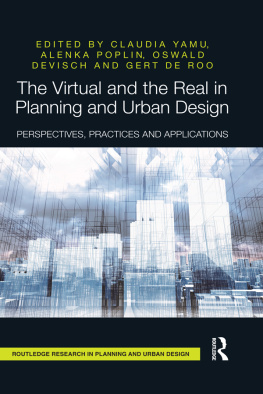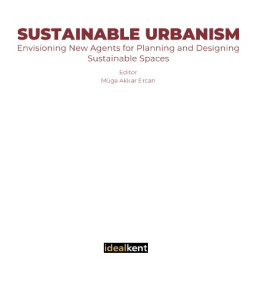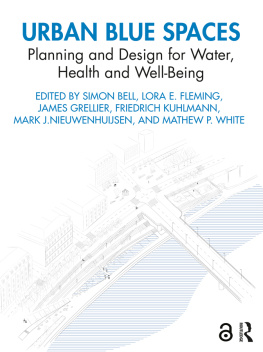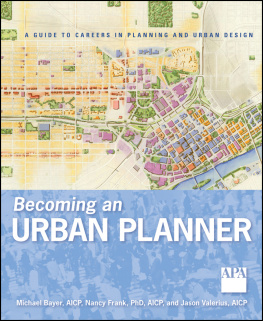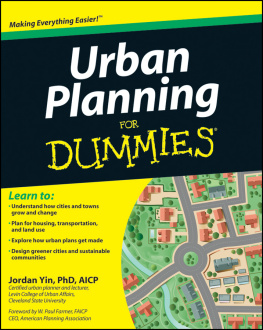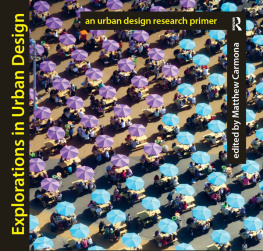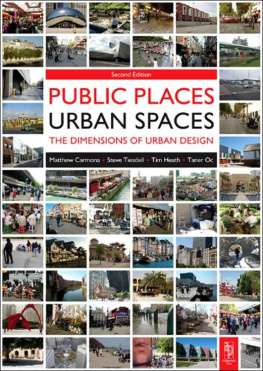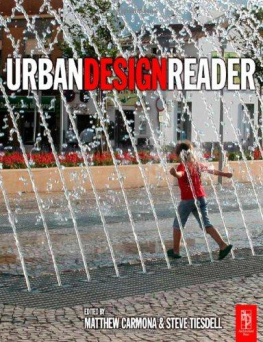First published 2018
by Routledge
2 Park Square, Milton Park, Abingdon, Oxon OX14 4RN
and by Routledge
711 Third Avenue, New York, NY 10017
Routledge is an imprint of the Taylor & Francis Group, an informa business
2018 selection and editorial matter, Claudia Yamu, Alenka Poplin, Oswald Devisch and Gert de Roo; individual chapters, the contributors
The right of Claudia Yamu, Alenka Poplin, Oswald Devisch and Gert de Roo to be identified as the authors of the editorial material, and of the authors for their individual chapters, has been asserted in accordance with sections 77 and 78 of the Copyright, Designs and Patents Act 1988.
All rights reserved. No part of this book may be reprinted or reproduced or utilised in any form or by any electronic, mechanical, or other means, now known or hereafter invented, including photocopying and recording, or in any information storage or retrieval system, without permission in writing from the publishers.
Trademark notice: Product or corporate names may be trademarks or registered trademarks, and are used only for identification and explanation without intent to infringe.
British Library Cataloguing-in-Publication Data
A catalogue record for this book is available from the British Library
Library of Congress Cataloging-in-Publication Data
Names: Yamu, Claudia, 1976- editor. | Poplin, Alenka, editor. | Devisch,
Oswald, 1975- editor. | Roo, Gert de, editor.
Title: The virtual and the real in planning and urban design :
perspectives, practices and applications / edited by Claudia Yamu,
Alenka Poplin, Oswald Devisch and Gert de Roo.
Description: New York : Routledge, 2017. | Series: Routledge research in
planning and urban design | Includes bibliographical references and index.
Identifiers: LCCN 2017020611 | ISBN 9781138283480 (hb : alk. paper) |
ISBN 9781315270241 (ebook)
Subjects: LCSH: City planning--Technological innovations. |
Technology--Social aspects.
Classification: LCC HT153 .V57 2017 | DDC 307.1/216--dc23
LC record available at https://lccn.loc.gov/2017020611
ISBN: 978-1-138-28348-0 (hbk)
ISBN: 978-1-315-27024-1 (ebk)
Typeset in Sabon
by Saxon Graphics Ltd, Derby

Mona Abdelwahab is an Assistant Professor in Architecture, Department of Architecture and Environmental Design at the Academy for Science, Technology and Maritime Transport, Egypt. She received her PhD degree in Architecture from Newcastle University, UK, where she is currently a visiting research fellow working with Prof Emeritus Patsy Healey on her ideas of collaborative planning theory. Her research work crosses the disciplines of architecture, urban design and planning and is focused on theory and philosophy, particularly post-structuralism and deconstruction.
Yasushi Asami is a Full Professor in the Department of Urban Engineering at the University of Tokyo. His research interests focus on city planning, housing policy and spatial information analysis. He is the Editor-in-Chief of the Urban and Regional Planning Review . He is a member of the editorial board of Computers, Environment and Urban Systems . He worked as the President of the GIS Association of Japan from 2010 to 2012, and is now working as a Vice-President of the Association of Urban Housing Sciences.
Martin Bielik is a Researcher at Bauhaus University Weimar. His research focuses on predictive modelling of human perception and behaviour in urban space. He has a background in computational architecture and urban planning.
Nick Brown is a graduate of Iowa State University and holds a Bachelor of Science in Community and Regional Planning. His interests include environmental studies, sustainability and public administration.
Artem Chirkin graduated from a double-degree programme in Computational Science at University of Amsterdam and ITMO University, Saint-Petersburg before coming to ETH Zurich as a PhD student. He aims to develop a machine learning algorithm to support designers by suggesting a set of optimal solutions during an urban district design process.
Gert de Roo is a Full Professor in Spatial Planning and Head of the Department of Spatial Planning and Environment, the Faculty of Spatial Sciences, at the University of Groningen. He has been President of the Association of European Schools of Planning (AESOP) representing 150 Schools of Planning throughout Europe. His research focuses on non-linear development of urban space and place, linking the complexity sciences with spatial planning, the rationalities of planning and decision-making, the development of decision-making models supporting choices concerning interventions within the urban environment, relating complexity thinking and planning theory, and managing transitions of space.
Oswald Devisch is an Associate Professor of Urban Design at the Faculty of Architecture and Arts at Hasselt University, Belgium. He is coordinator of the research cluster Spatial Capacity Building and explores themes such as civic learning, casual participation, collective image building, autonomous spatial transformations and low-dynamic regions.
Stephen Dobson is a Senior Research Fellow in the International Centre for Transformational Entrepreneurship (ICTE), Coventry University and the Book Reviews Editor for the International Journal of Entrepreneurship and Innovation. In 2011-2015 he was the UK representative on the management committee for the European Academy of Management (EURAM) and is currently on the management committee for the COST Action Interdisciplinarity in research programming and funding cycles (INTREPID). Stephens research interests include entrepreneurial urbanism, transformational entrepreneurship, organizational and digital space, planning and sustainable development.
Dirk Donath is a Full Professor and Chair of the Department of Computer Science in Architecture at Bauhaus University Weimar, Germany. He is an editorial board member of the journal IJAC International Journal of Architectural Computing.
Anton Elins is a Lecturer in the Computer Science department of the Faculty of Science of the Vrije Universiteit Amsterdam, where he teaches multimedia courses, including serious games. He was coordinator of the Master Multimedia for Computer Science, and assisted in developing the Creative Technology curriculum of the University of Twente, where he was appointed as a Professor in New Media. His current interests are focused on the promotion of the interactive media-platform, XIMPEL, currently being applied to (serious) educational games, and his latest project involves the campaign(s) against noise.
Ava Fatah gen. Schieck is an Associate Professor (Reader) in Media Architecture and Urban Digital Interaction and leads the Embodied Technologies unit (Body as Interface and City as Interface studios) on the MRes/MSc Architectural Computation Programme at the Bartlett School of Architecture, University College London. The main focus of her research is in the area of Architecture, Interaction Design, Mixed Reality and Ubiquitous Computing with the overarching goal of developing a framework for the integration of digital media (situated and mobile) and architecture. She is the Principal Investigator of the Screens in the Wild, which explores the potential of networked urban screens for communities and culture. Fatah was a Chair and a member of the organizing committee for the 2012 Media Architecture Biennale, 2014 in Aarhus (DK) and 2016 in Sydney (Australia) and 2018 in Beijing.
Pierre Frankhauser is a Full Professor at the Universit de FrancheComt and an honorary member of the Institut Universitaire de France. He holds a PhD in Theoretical Physics from the University of Stuttgart and a PhD in Geography from Universit de Paris PanthonSorbonne. He works on the use of fractal geometry for modelling, and its logic for analysing urban patterns and transportation networks for promoting sustainable spatial development. He is interested in exploring and modelling residential choice behaviour.

